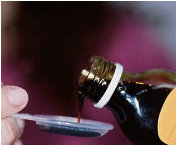 |
 |
Propolis comes from the greek "pro", which means "before", and "polis" which means "city". Therefore, propolis means "in front of the city", to refer to a substance that is accumulated around the hive to allow an easier defence of the colony.
» Composition |
| Resins and balms |
50 - 55% |
| Wax |
30% |
| Essential oils and volatile substances |
10 - 15% |
| Other organic substances and minerals |
5 % |
|
Its composition varies in relation to the areas and plant species on which it is harvested. It is slightly soluble in water, whereas it is soluble in alcohol at 95°. In ancient Egypt the Propolis was used to embalm the bodies, while in Greece at the time of Aristotle it was used to treat infections of the skin. In many fields of medicine it is used for its antibacterial, antiseptic and antifungal properties. It is very useful as a healing and immunostimulant. Many aspects of its action are still being studied.
» IDirections and uses:
The Propolis is used mainly to combat respiratory infections, both in adults and in children, such as colds, flu, tonsillitis, pharyngitis, rhinitis, laryngitis, sinusitis and otitis. It is also useful for oral hygiene, bad breath, gingivitis and mouth inflammation in general. It is used also for genito-urinary infections, skin manifestations as herpes, acne, eczema, mycosis of the scalp, dry dandruff, cracked and reddened skin, skin burns, slow and difficult cicatrizations.
» Warnings:
As with all natural and synthetised products, propolis may cause, although very rarely, allergies that generally occur with skin reactions, especially in people already sensitized to bee venom. If this were to verify, one must suspend the treatment. |
|
 |
|


